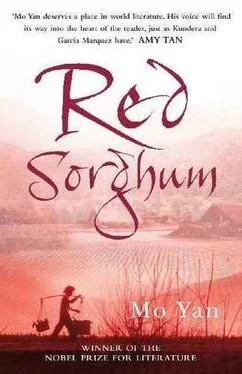He looked up to see a man in his thirties with a flat, chiselled face, yellow skin, and a long, jutting chin. He was wearing a chestnut-coloured wool cap and brandishing a black pistol! A forest of yellow-clad legs was aligned behind him, the calves wrapped in wide, crisscrossed cloth leggings. His eyes travelled slowly upward past protruding hips, stopping at dozens of alien faces, all adorned with the smug smile of a man taking a comfortable shit. A Rising Sun flag drooped under the bright-red sunrise; onion-green rays glinted off a line of bayonets. Pocky Cheng’s stomach lurched, and his nervous guts relinquished their contents.
‘Get up here!’ Chestnut Wool Cap barked out angrily.
Pocky Cheng climbed out of the ditch. Not knowing what to say, he just bowed repeatedly.
Chestnut Wool Cap was twitching right under his nose. ‘Are there Nationalist troops in the village?’ he asked.
Pocky Cheng looked at him blankly.
A Japanese soldier waved a bloodstained bayonet in front of Pocky Cheng’s chest and face. He heard his stomach growl and felt his intestines writhe and twist slowly; at any other moment, he would have welcomed the intensely pleasant sensation of a bowel movement. The Japanese soldier shouted something and swung the bayonet, slicing Pocky Cheng’s padded jacket down the middle and freeing the cotton wadding inside. The sharp pain of parted skin and sliced muscles leaped from his rib cage. He doubled over, all the foul liquids in his body seeming to pour out at once.
He looked imploringly into the enraged Japanese face and began to wail.
Chestnut Wool Cap drove the barrel of his pistol into his forehead. ‘Stop blubbering! The commander asked you a question! What village is this? Is it Saltwater Gap?’
He nodded, trying hard to control his sobs.
‘Is there a man in the village who makes straw sandals?’ Chestnut Wool Cap softened his tone a little.
Ignoring his pain, he eagerly and ingratiatingly replied, ‘Yes yes yes.’
‘Did he take his straw sandals to market day in Gaomi yesterday?’
‘Yes yes yes,’ he jabbered. Warm blood had slithered down from his chest to his belly.
‘How about pickles?’
‘I don’t know… don’t think so….’
Chestnut Wool Cap slapped him across the mouth and shouted: ‘Tell me! I want to know about pickles!’
‘Yes yes yes, your honour,’ he muttered obsequiously. ‘Commander, every family has pickles, you can find them in every pickle vat in the village.’
‘Stop acting like a fucking idiot. I want to know if there’s somebody called Pickles!’ Chestnut Wool Cap slapped him across the face, over and over.
‘Yes… no… yes… no… Your honour… don’t hit me. . Please don’t hit me… your honour…’ he mumbled, reeling from the slaps.
The Japanese said something. Chestnut Wool Cap swept the hat off his head and bowed, then turned back, the smile on his face gone in an instant. He shoved Pocky Cheng and said with a scowl, ‘We want to see all the sandal makers in the village. You lead the way.’
Concerned about the dung basket he’d left on the wall, Pocky Cheng instinctively cocked his head in that direction. A bayonet that shone like snow flashed past his cheek. Quickly concluding that his life was worth more than a dung basket and spade, he turned his head back and set out for the village on his bandy legs. Dozens of Japs fell in behind him, their leather boots crunching across the frost-covered grass. A few grey dogs barked tentatively.
I’m really in a fix this time, Pocky Cheng was thinking. No one else went out to collect dogshit, no one but me, and I ran into some real dogshit luck. The fact that the Japanese didn’t appreciate his good-citizen attitude frustrated him. He led them quickly to each of the sandal makers’ cellars. Whoever Pickle was, he was sure in one now. Pocky Cheng looked off into the distance towards his house, where green smoke curled into the sky from the solitary kitchen chimney. It was the most intense longing for home he’d ever known. As soon as he was finished he’d go there, change into clean pants, and have his wife rub some lime into the bayonet wound on his chest. The great woodwind player of Northeast Gaomi Township had never been in such a mess. Oh, how he longed for his lovely wife, who had grumbled about his pocked face at first, but, resigned at last, had decided that if you marry a chicken you share the coop; marry a dog and you share the kennel.
EARLY-MORNING GUNFIRE beyond the village startled Second Grandma out of a dream in which she was fighting Grandma tooth and nail. She sat up, her heart thumping wildly, and, try as she might, she couldn’t decide if the noise had just been part of the dream. The window was coated with pale morning sunlight; a grotesque pattern of frost had formed on the pane. Shuddering from the cold, she tilted her head so she could see her daughter, my aunt, who was lying beside her, snoring peacefully. The sweet, even breathing of the five-year-old girl soothed Second Grandma’s fears. Maybe it was only Old Geng shooting at wild game, a mountain lion or something, she consoled herself. She had no way of knowing how accurate her prediction was, nor could she have known that while she was sliding back under the covers the tips of Japanese bayonets were jabbing Old Geng’s ribs.
Little Auntie rolled over and nestled up against Second Grandma, who wrapped her arms around her until she could feel the little girl’s warm breath against her chest. Eight years had passed since Grandma had kicked her out of the house. During that time, Granddad had been tricked into going to the Jinan police station, where he nearly lost his life. But he managed to escape and make his way home, where Grandma had taken Father to live with Black Eye, the leader of the Iron Society.
When Granddad fought Black Eye to a standstill at the Salty Water River, he touched Grandma so deeply she followed him home, where they ran the distillery with renewed vitality. Granddad put his rifle away, bringing his bandit days to an end, and began life as a wealthy peasant, at least for the next few years. They were troubling years, thanks to the rivalry between Grandma and Second Grandma. In the end, they reached a ‘tripartite agreement’ in which Granddad would spend ten days with Grandma, then ten days with Second Grandma — ten days was the absolute limit. He stuck to his bargain, since neither woman was an economy lantern, someone to be taken lightly.
Second Grandma was enjoying the sweetness of her sorrows as she hugged Little Auntie. She was three months pregnant. A period of increased tenderness, pregnancy is a time of weakness during which women need attention and protection, and Second Grandma was no exception. Counting the days on her fingers, she longed for Granddad. He would be there tomorrow.
Another crisp gunshot sounded outside the village, and Second Grandma scrambled out of bed. She, too, had heard rumours that the Japanese would be coming to sack the village, and she was unable to drive away the dark premonition of impending doom. She’d willingly go home with Granddad, even if it meant putting up with Grandma’s abuse, for it couldn’t be worse than living in Saltwater Gap in constant dread. But Granddad had flatly refused, most likely, I believe, because by then he was cowed by the irreconcilable differences between the two women. He would come to regret this decision, for on the following morning he stood in a yard bathed by the warm rays of the late-October sun and gazed upon the tragic consequences of his mistake.
Little Auntie, awake by now, let out an affected yawn, her eyes shining like small bronze buttons; then she sighed, just as if she were a grown-up. That frightened Second Grandma, whose power of speech momentarily deserted her.
Читать дальше












